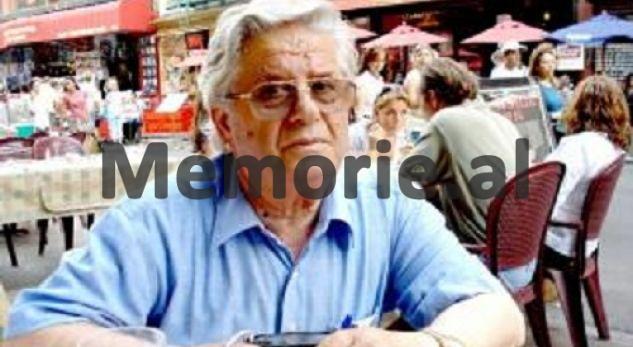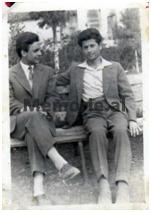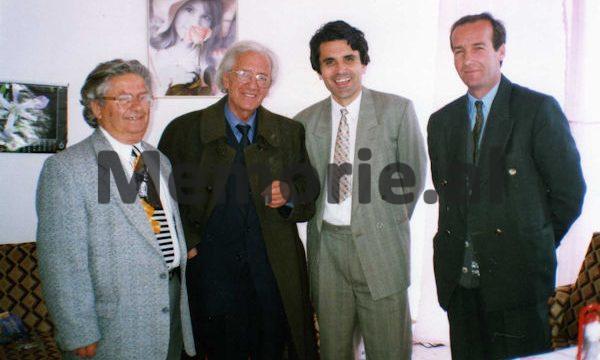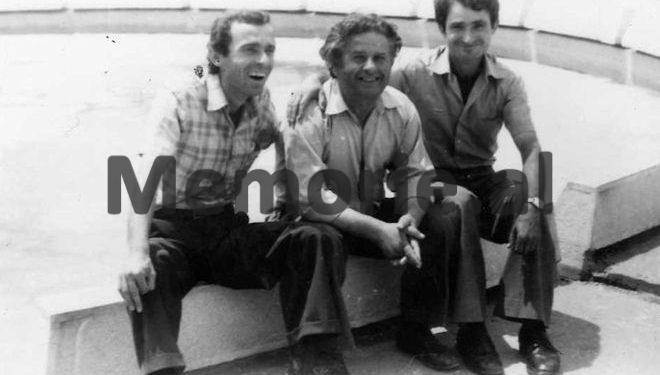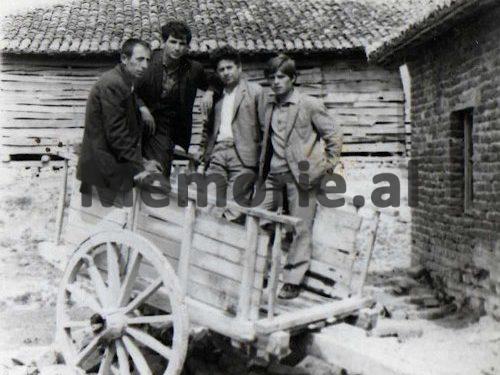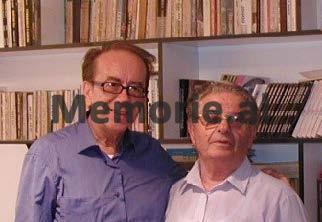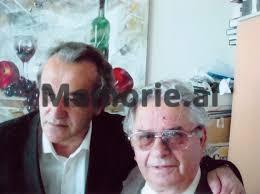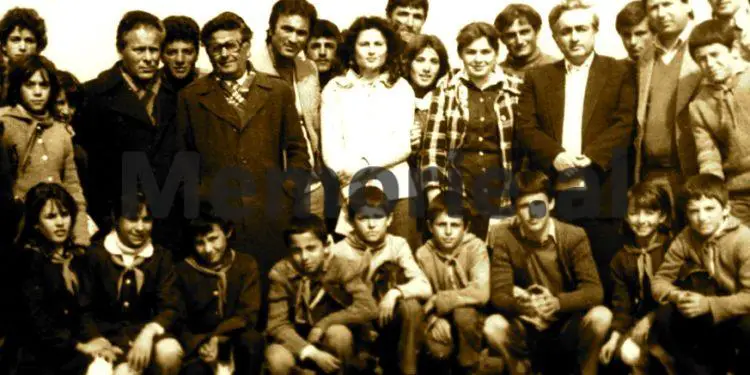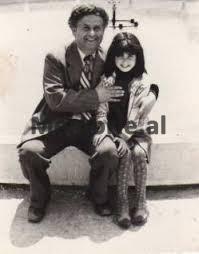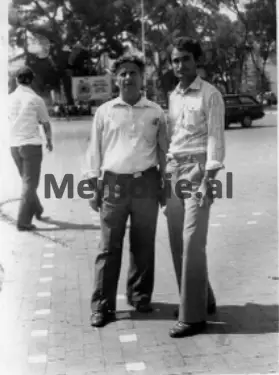Dashnor Kaloçi
While publishing his first poems with the help and support of Kadare and Agolli, being evaluated as a young poet of the future, he was fiercely attacked by Ramiz Alia, who called his poems worthy of Le Mond “.Thereafter the Lushnja Party Committee and the First Secretary himself, I Rrapi Gjermeni, called him to several meetings, where he was exposed as “an enemy who had called for the overthrow of the popular power”. This is how the famous poet Faslli Haliti, author of over 20 volumes of poetry and a former Socialist MP in 1998-2005, who is 1973 “for conceptual errors” was removed by teachers and sent to production working for four years at the Fier-Shegan Cooperative in Lushnje. For all those vicissitudes, Haliti testifies in the exclusive Memorie. al interview we are publishing below in this article.
Haliti: Agolli and Kadare protected me from the attacks of the First Secretary of Lushnja
While the young poet Faslli Haliti had the backing of well-known writers Kadare and Agolloi, he was attacked by the Lushnja Party Committee. Regarding this, he recalls: “After publishing the poetry cycle in ‘Drita’, Dritri met me and said: ‘It was a very strong and realistic cycle. I do poetry too, but I can’t write such poems. ‘ I also commended the Minister of Culture, Dashnor Mamaqi, who said at a meeting with the Voice of the People: ‘Here are poems such as we need’. But otherwise, it was the work of the Lushnja Party Committee, which, at the urging and insistence of the First Secretary, Rrapi Germeni, attacked me vigorously, putting against me a group of students who criticized the local newspaper “Shkëndia”. With that newspaper in hand, I went to Kadare, who told me: ‘This criticism must be criticized. Ramiz Alia also spoke the best words to me about this poem. You know what you Faslli, wrap in the envelope this criticism made by “Spark” and post to Prime Minister Mehmet Shehu, says: This is your democracy ?! After meeting Kadare, who was very angry, with the newspaper “Spark” I went back to Driteroi, who told me: “This is not a criticism, but an accusation, and with that, you put yourself in jail.”
Mr. Haliti, how do you remember the first beginnings of poetry?
I published my first poems in the wallpapers of the late 1950s as I continued my Artistic Lyceum for painting in Tirana and a great impetus to write was given to me by my esteemed teachers, Pandora Dedja and Kemal Xhomo. I published my first poem on April 22, 1963, in the newspaper “Voice of Youth” under the heading “Young Voices”, a poem that attracted Kadare’s attention, who called me and published a cycle in the “Drita” newspaper. From then on he continued to support and publish my poems, which I sent with the “People’s Painter”, Skender Kamberi.
So Kadare and Agolli initially supported them to approach him as a poet?
It is also, with Kadare’s support, somewhat affirmed as a young poet, and in 1966, I published the first book of poetry entitled “Today”, for which Ismaili wrote a praiseworthy essay on “Light”. Kadare summed up this writing in 1972 in his book “The Autobiography of My People in Verses”. But while I had the support of renowned writers and poets, at the time I was severely attacked by the Lushnja Party Committee.
Why did this happen?
In fact, I had problems with the criticism in the first poems when I was taken to Hosteni in the “Jewelry Press” section, but they were nothing at all, which I then suffered.
Why what happened to you, what was that criticism?
The first harsh criticism against me came in December 1966 in “Light” by Vangjush Zallemi, who criticized me for his poem “Against the Sparrows”. In fact, Zalem was pushed by the Lushnja Party Committee, because shortly before that writing, the secretary for Ideology and Propaganda called me and said, “What is this poem, you are against the spears. I.e. that spring is only in the West, and here we have only mud and rain and it becomes a shrub. This is how you present our place to Ibrahim”.
How did you respond?
I said, “Turn to the press that published it for me,” and then Zalem’s writing came out. After the writing, there was a meeting of the Party Committee chaired by the First Secretary, Rrapi Gjermeni, who criticized me sharply with the well-known “black reality” formula. As I wanted to explain, he said to me, “Close my mouth, that I cannot understand cosmopolitanism and not you.” Even after that meeting, I continued to publish, but the attacks by the Apartheids did not cease. This is how it was in 1972 when Suleyman Mato published a cycle of “Light”, which was regarded as the instigator of reality, and after that great troubles and troubles began for me.
What exactly happened?
The Party Committee in Lushnje was very alarmed because at that time I had a poem entitled “The Secretary’s Son”, and I had received spunton from actual events in our city. From this, the German Raptor became very excited, and in December 1972, when I published the poem “The Sun and the Streets,” the great blow began upon me, which he personally encouraged and directed. Initially, Rrapi fired an undocumented literature teacher and he instructed 10 high school students who wrote a letter against me in Lushnja’s “Shkëndija” newspaper, entitled “The Sun and a Clown” (a title that was later relieved).
What was said in that scripture?
It was alleged that I had a “distant shooting” called for the violent overthrow of popular power. Following the publication of that article, a meeting was held at the House of Culture, were delegated by the Central Committee was Pipi Mitrojorgji, and by the League of Writers, Theodor Laco. There he spoke in favor of and against me, but Laco defended me, saying, “Well, the grain tree is stoned.” After that, I went to Kadare, who helped me meet Ramiz Alia.
How did you receive and what did Ramiz Alia say to you?
Ramiz in the presence of Prof. Hamit Beqes and the two newspapers (“Voice of Youth” and “Spark”) said in my hand: “To be frightened by the critics. The poem is ideologically wrong, but we disagree with this criticism of you. We will therefore, warn the comrades of the “Spark” and those of the Party Committee. ” Ramiz was outraged after criticizing me for saying “it’s too late” and he said: ” how about without being put in jail”.
So Ramiz defended you?
At first, it seemed so, and I was somewhat calmed by Ramiz’s words, but that calm did not last long as he had spoken differently at a meeting with press workers where he said: “You of the Voice of Youth have published the poem” The Sun and Faslli Haliti’s slippers worthy of “Le Mond” and Victor Qurck’s writings are worthy of “Pravda”. Following his speech, the First Secretary of Lushnja, Rrapi Gjermeni, took heart and called me to another meeting of the Party Committee, where he had summoned all the Benjamin lukewarm, headed by Gazmend Kongoli, who was the whip. chief of the artists and writers of our district.
What happened at that meeting?
The meeting was just for me, and I was kept there for 4 hours. It was the end of March 1973 and by that time the crackdown on the 11th Festival of Albanian Radio and Television had begun. The Germans considered me “an enemy that I had mobilized scum calling on them to seize weapons to overthrow popular power.” As Gazmend Kongoli said: “This poem strikes popular power rib by rib”.
What happened to you after that meeting?
A literary teacher in the city of Lushnja sent me to production at the Fier-Shegan Agricultural Cooperative, near the Berat border, where I worked for 4 years in all the farming jobs. Likewise, my wife, Nirvana Xhomo, was sent to the village for 20 years. I did not complain, as I said that thankfully I saved so much, as there were worse. But a young student from Lushnja, Fatbardh Rustemi, wrote to Enver Hoxha complaining about my sentence and Gazmend Kongoli’s privileges and company.
What happened after that letter?
White was summoned by the Dean of the Faculty and said, “You’re worried about Comrade Enver,” but White responded boldly: “Let me meet him and calm him down.” After four years in the cooperative, I was asked to apply and was accepted back into Education. Since then I have continued to write and publish again. Memorie.al




